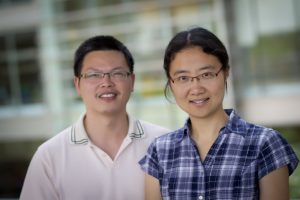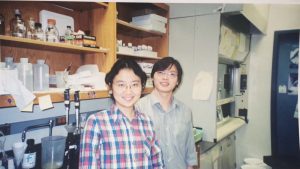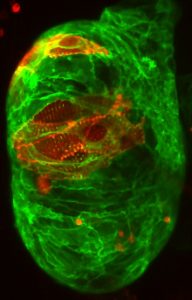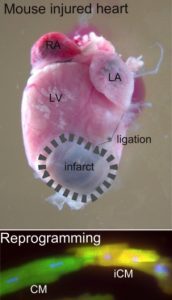Li Qian, PhD, and Jiandong Liu, PhD, associate professors in the department of Pathology and Lab Medicine, have each won prestigious Established Investigator Awards from the American Heart Association for their separate research on how to heal damaged heart tissue. Their own hearts belong to each other, and the family they’ve built together both at home and at the UNC School of Medicine.

CHAPEL HILL, NC – After two decades of collaboration in and out of the lab, Li Qian, PhD, and Jiandong Liu, PhD, have both been awarded the highly competitive Established Investigator Award from the American Heart Association (AHA) to support investigators whose careers are in a rapid growth phase, have unusual promise and show established records of accomplishments. All of this perfectly describes Qian and Liu, spouses who’ve made crucial independent discoveries related to heart muscle regeneration and cardiac development, respectively.
Their story is one of dedication to their work, to their family, and to the communities of researchers they helped establish at three universities, including UNC-Chapel Hill, where they have thriving labs in which the balance of research passion and family life is paramount.

Qian and Liu received their bachelor of science degrees from Fudan University in Shanghai, China. They didn’t meet each other until they both pursued doctoral training at the University of Michigan under the mentorship of Rolf Bodmer, PhD, a leading scientist in developmental biology, focusing on genes and molecular mechanisms that regulate heart development.
“We were always the students who worked late in the lab,” Qian said. “As we worked together, we got to know each other, and we fell in love.”
And so, in the midst of throwing themselves into heart research, they decided to take another leap together – marriage – and a couple of years later, their first child arrived.
While Qian and Liu grew their family, their specific cardiology research interests began to take shape. From Michigan, their young family moved to California, where Qian and Liu worked as postdoctoral researchers at the University of California San Francisco. Qian became a fellow at the Gladstone Institute for Cardiovascular Disease, studying in the lab of Deepak Srivastava, learning about the role of microRNAs in mouse heart development and function, and exploring strategies for reprogramming cardiac fibroblasts into cardiomyocytes for regenerative purposes. Liu’s work in the Department of Biochemistry and Biophysics with Didier Stainier, PhD, introduced him to the use of zebrafish as a model system to study cardiovascular development and disease.
During this time at UCSF, Qian and Liu began advancing in their individual fields of research, making an impression on not only the researchers around them, but throughout the heart research community. Qian was selected as the recipient of the 2011 AHA Katz Prize for Basic Research, the most prestigious award the AHA gives to young investigators. She was also first author of a publication in Nature about methods for growing new heart muscle that was highlighted by the AHA as one of the Top 10 Advances in Heart Disease and Stroke Research in 2012.
Liu also developed into a highly productive investigator, performing innovative and cutting-edge cardiovascular research that shed light on how hearts form and mature.
Because of these accomplishments and the doubtless success they would have going forward in their careers, Qian and Liu were jointly recruited to the UNC School of Medicine in 2012, shortly after the arrival of their second child.
“We applied at the same time but did not indicate we were husband and wife,” Qian said. “But they figured it out somehow, and really did a great job recruiting us as a family. When we interviewed, a UNC grad student actually took our older daughter to a park and got her ice cream. Our daughter still remembers this. It was clear that UNC wasn’t just a place we could have jobs, but a supportive community in which we could thrive.”
Since 2012, Qian and Liu have settled in at UNC. Qian is now an associate professor in the Department of Pathology and Laboratory Medicine, associate director of the McAllister Heart Institute and a member of the Lineberger Comprehensive Cancer Center. Liu is also an associate professor in the Department of Pathology and Laboratory Medicine and a member of the McAllister Heart Institute. They both run their own research labs, continuing the research they began at UCSF.

The Liu lab combines genetics with molecular and cell biology to study cardiac development and function, focusing on the molecular mechanisms that link mechanical forces and genetic factors to cardiac morphogenesis. His lab uses zebrafish as a model system to address the key questions in cardiac development and function, and could provide new therapeutic interventions for cardiac diseases.
“I’ve always been interested in cardiac biology because most cardiac disease starts with a birth defect,” Liu said. “Sometimes a congenital heart defect can be corrected by surgery, but other patients don’t have much of an option to help them, sometimes not even drugs. This is why we want to understand the molecular biology of the cardiac environment and find an intervention for congenital heart disease.”
In his time at UNC, Liu has published nearly 40 peer-reviewed articles, several of which include findings that could have considerable impact on the development of more potent therapeutics for the treatment of heart disease. In 2019 Liu was a recipient of UNC’s prestigious Jefferson Pilot Award. He is also sought after for speaking engagements at national and international meetings for his work on heart development and function, and serves on the American Heart Association grant review committee.
The Qian lab studies how to transform damaged heart cells into viable muscle cells. By understanding the molecular basis of cardiomyocyte specification and maturation, they can apply the knowledge to improve efficiency and clinical applicability of cellular reprogramming in heart disease.
“The concept itself of repairing damaged cells can be applied to many other diseases in the body,” Qian said. “Neurodegenerative diseases like Parkinson’s could be remedied by using the nonfunctional or scarred brain cells to become new neurons. The same concept applies to lungs, kidneys, or really any kind of organ tissue repair and regeneration.”

Qian’s research group has published over 40 high-quality, high-impact research articles in peer-reviewed journals, proving her to be a pioneer in cardiac reprogramming. Her lab’s more recent work pushed cardiac reprogramming in human patients one step closer to reality, with an eye toward helping millions of people recover from the debilitating effects of heart attacks.
Qian and Liu don’t just run labs and produce groundbreaking research, they also teach and form relationships with the people working in their labs. In recognition of her passion and dedication to teaching and mentoring, Qian was given the UNC Outstanding Mentor Award in 2017, becoming the youngest awardee in UNC history.
“It takes a village to conduct the type of research we are interested in,” Qian said. “We appreciate UNC as a whole, and feel very grateful to have a supportive and collaborative environment. We want our trainees to know they can pursue their passion and still have a family. This award from the AHA is very good evidence of that.”
Qian and Liu were separately nominated for the AHA’s Established Investigator Award, a very competitive grant program. Liu says knowing they were competing against each other makes the honor that much better.
“It is really exciting,” Liu said. “This means that we are being recognized as establishments in this field and that our careers are still growing. I feel honored to receive the award and it makes me even more hopeful for what we can accomplish.”
“We made it through all the difficulties of our early careers and I hope our accomplishments inspire others,” Qian said. “Following a path in academia isn’t easy, so we need to continue encouraging the future researchers in our community. If you work hard enough and continue to pursue what you want, honor will come with your perseverance.”
The AHA Established Investigator Award is a five-year grant that supports developing research that aligns with the AHA’s mission to be a relentless force for a world of longer, healthier lives.
Contact: Carleigh Gabryel, 919-864-0580